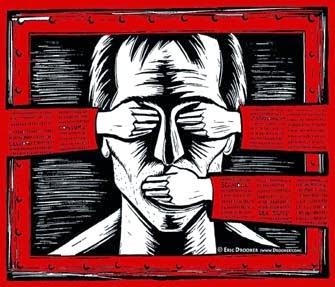 Legal Schnauzer Publisher Roger Shuler has been released from five months in the Shelby County Jail, but numerous legal issues remain from his incarceration. No. 1 on the list probably is censorship, and a long line of court cases points in that direction.
Legal Schnauzer Publisher Roger Shuler has been released from five months in the Shelby County Jail, but numerous legal issues remain from his incarceration. No. 1 on the list probably is censorship, and a long line of court cases points in that direction.Loyal readers have helped sustain this blog during a traumatic time, and we invite your financial support to help continue the battle. Donations can be made by clicking on the donate button to the right.
Shuler was incarcerated because of a civil-contempt charged based on a preliminary injunction in a defamation lawsuit. But American law long has held that such injunctions constitute an unlawful prior restraint and are forbidden under the First Amendment.
This is perhaps most strongly stated in Near v. Minnesota, a ground-breaking 1931 case on the subject of free-speech restrictions. From the opinion of Chief Justice C.J. Hughes in the Near case, addressing a Minnesota "anti defamation" statute and the issue of contempt:
If we cut through mere details of procedure, the operation and effect of the statute, in substance, is that public authorities may bring the owner or publisher of a newspaper or periodical before a judge upon a charge of conducting a business of publishing scandalous and defamatory matter -- in particular, that the matter consists of charges against public officers of official dereliction -- and, unless the owner or publisher is able and disposed to bring competent evidence to satisfy the judge that the charges are true and are published with good motives and for justifiable ends, his newspaper or periodical is suppressed and further publication is made punishable as a contempt. This is of the essence of censorship.
To anyone who has followed my case, those words from 1931 should be particularly chilling.
